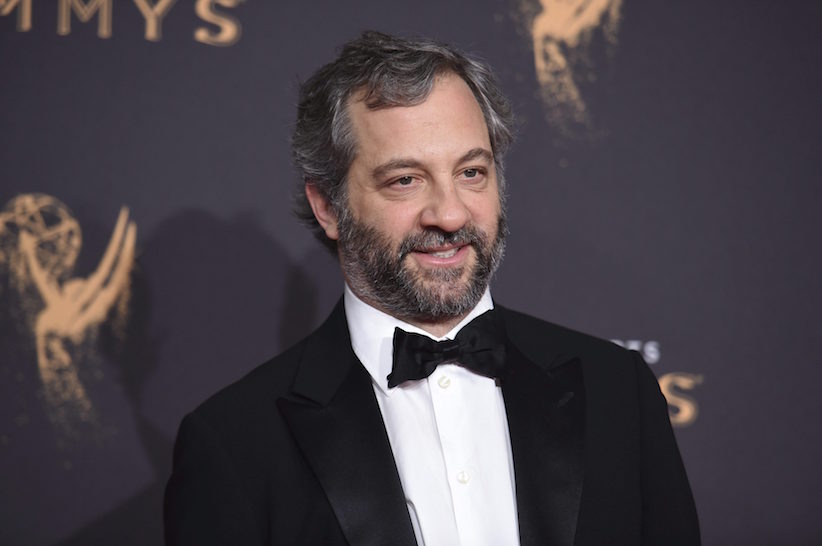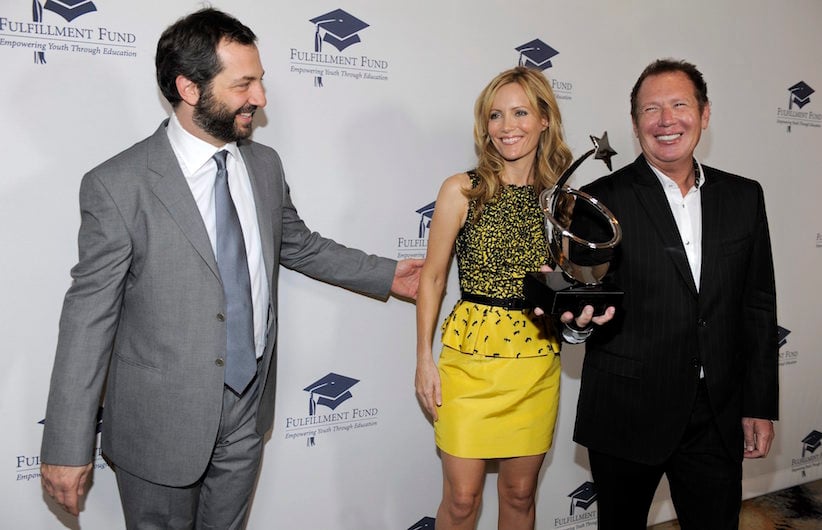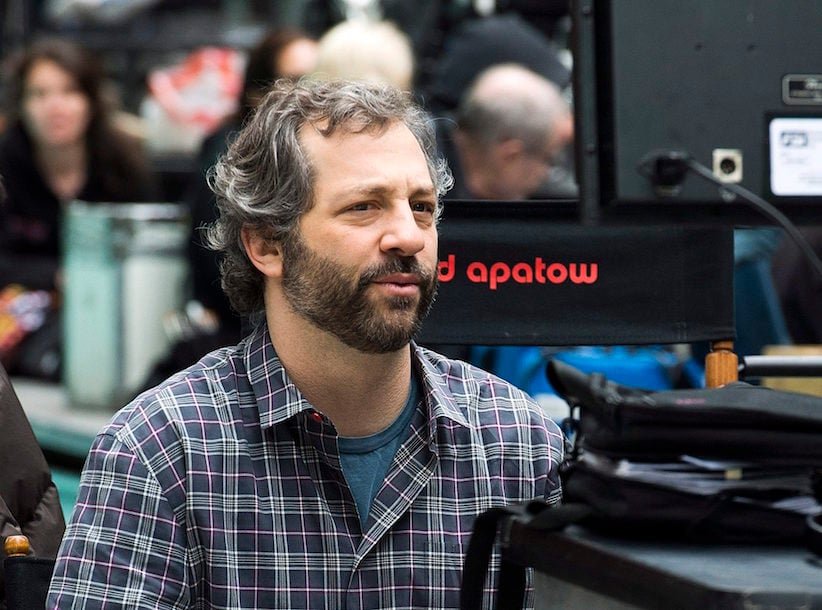This is 50: Judd Apatow on comedy, politics and mentorship
The writer, director and comedian discusses his relationship with late mentor Garry Shandling, his reluctance to be political and his hopes for #MeToo
Producer Judd Apatow watches a monitor while filming “Anchorman: The Legend Continues” on Saturday, May 18, 2013 in New York. (Photo by Charles Sykes/Invision/AP)
Share

Since The 40-Year-Old Virgin, comedian polymath Judd Apatow has been one of the kings of comedy. Thirteen years later, after directing critical and commercial hits like Knocked Up, Funny People, and This Is 40, the laughs and insights continue to zing in the 50-year-old’s work. Following on from his cameo in The Disaster Artist, his 2018 slate includes his Netflix special Judd Apatow: The Return, and producing the HBO comedy Crashing.
Now, he’s set to release The Zen Diaries of Garry Shandling, an in-depth, four-and-a-half-hour documentary about the late comedian behind The Larry Sanders Show and It’s Garry Shandling’s Show. Apatow says Shandling was his most important mentor for more than 25 years, and funny people like Jerry Seinfeld, Sacha Baron Cohen, Sarah Silverman, and The Simpsons’s Al Jean talk candidly about how Shandling inspired them.
Philosophical and enthusiastic, Apatow spoke to Maclean’s about his hopes for #MeToo and #TimesUp, the dark comedy of 53 per cent of white women voting for Donald Trump, everybody’s weird thoughts, and being reluctantly political. This interview has been condensed and edited.
Q: Congratulations on your documentary The Zen Diaries of Garry Shandling. As shown in your book Sick in the Head, you appreciate the medium of interviews, and deliver on their potential.
A: Thank you, I appreciate that. As you said that I realized that this is the first time people get to see me doing the interviews. I thought the best way to talk about Garry would be in conversations that you would see. Because that’s how comedians talk about other comedians. We sit and we laugh and share stories, and it felt appropriate to talking about Garry and his life.
Q: Your close relationship with Garry and his circle meant that you had access not just to his people, but also to his journals and full archive, and their insights and depth. Was there anything that surprised you making it?
A: The thing that surprised me the most was the fact that his mentoring was a conscious decision. I knew he was always helpful, he seemed to be there for everybody. If you had a script he would read it, and give you notes, which was a big deal. It’s a pain in the ass to read long scripts and think deeply about them. But in his journals he wrote on one page, “Learn to grow old gracefully; learn to become a mentor gracefully.” And I was very moved by that. It wasn’t just something he was stumbling into as a nice guy; he knew he had something to give to people, and he did it as an act of love.
Q: You’ve been pretty generous yourself in helping creative people realize their ideas: You have producing credits from Crashing to Girls via The Big Sick and Bridesmaids. “I certainly feel like I got hit with the lucky stick. I feel like it’s my Willy Wonka, I feel like I got the factory,” Melissa McCarthy told me about working with the likes of you.
A: I got such incredible advice from Garry for decades, and one aspect of the movie that I’m excited about is that, when you watch the movie, in a way you’re getting mentored by Garry, both comedically and about life. So that seems to me to be the best gift that I could help give people. This is what Garry would want people to know about life and creativity.
We did a memorial for Garry after he passed, and it was very moving when people came up and told stories. Everyone in the room was surprised to learn about Garry’s spirituality and what he was attempting to do with his life and what his history was. It felt like a religious experience. With the documentary, I was trying to capture how people felt at the end of his memorial.
Q: In the documentary you say Garry was your most important mentor for 25 years, but remained a mystery to you. Is he still mysterious to you?
A: Much less so. There are conversations that you are afraid to have when someone’s around, because you don’t know if it’s appropriate to dig for information. Garry had only mentioned the fact that he had a brother who passed away when he was a child once, and it didn’t feel like it was OK to ask about. That might have been wrong, but he never mentioned it again. It turned out that it was a very formative experience for him, and led to many aspects of his personality.
Q: Pete Holmes, your Crashing protégé, told me that “Garry Shandling taught Judd, and Judd taught me: which is that if you believe the world, and the circumstances, and the characters, the comedy just kind of happens.”
A: Garry’s main intention was truth. He was trying to dig as deep as was possible in revealing the inner life of the character. And he always felt that if you did that well, it wouldn’t be hard to make it funny, because our lives are inherently funny. The ways in which we wear masks and are afraid to connect with people are sad in a way, but also really funny. He felt like people come up with a way they want to be seen and attempt to present that to the world, but the truth is what’s fun to reveal in these stories. Everyone’s trying to look confident and sexy and likeable and on top of their game, when in fact most people are crumbling. That’s one thing that he liked to explore.

Q: As Amy Schumer says about comedy as comfort in Sick in the Head: “It makes everyone feel better to acknowledge that no one has it together… I don’t know anyone that doesn’t have this big, dark cloud hovering over them.”
A: Sure. Even when you look at someone like Vice President Mike Pence, you can see how desperately he wants to be seen as normal, and he’s just so weird.
Q: Do you feel like you’ve become more political under Trump-Pence-Ryanism?
A: I wish I didn’t feel the need to, but it feels like this point in history where everybody needs to stand up and say how they feel about what’s happening. I don’t want to normalize any of this behaviour, and I disagree with the vast majority of their policy positions. So I have been drawn into speaking out.
I think as someone who’s Jewish, it certainly wakes up a part of me. When you’re headed in a bad direction, you must scream from the rooftops and try to stop it. It definitely feels like one of those kinds of situations. All kinds of people are getting hurt in very serious ways, whether it’s immigrants or people losing health insurance or people potentially losing their social security and the potential for ridiculous wars. There are just so many reasons to speak out right now. So hopefully people will vote, and things will begin to change in the fall. That’s what’s most important: that we encourage people to vote. Because as frustrated as everyone is, a lot of it ends if people vote and get rid of as many Republicans as we can, in the fall.
Q: Is there any potential black comedy in the fact that 53 per cent of white women voted for Donald Trump?
A: I think that there’s an enormous amount of dark comedy in all of this [laughs], but first we have to get through it. And it’s far behind us that it becomes, you know, funny movies about Melania’s plight.
Q: What do you hope is next with #MeToo and #TimesUp?
A: The most important part is that there is an awakening where people realize how badly women are treated. We want there to be new attitudes. In the entertainment industry, five per cent of movies are directed by women. That’s just criminal. There are so many ways in which women are disrespected, both in employment practices and how they’re paid and sexual harassment. So it’s very good that it’s all being brought out into the light. When that happens, we hope that large-scale changes occur as a result. It’s a seismic shift.
Q: We’re in a time of a lot of change, including with technology. Is contemporary art and entertainment a digital black hole?
A: I think about that all the time. I struggle with the idea of there being so much content, because as a creative person it makes me think, “Well, what’s the point of making anything if people are just drowning in content?” Most of what I’ve done I was excited about because I’ve felt like something like it didn’t exist. There wasn’t a show like Freaks and Geeks, there wasn’t a sketch show like The Ben Stiller Show, there weren’t movies like The 40-Year-Old Virgin… and now I have to remind myself that people are touched by the work, and if I think about the big picture too much it’ll only shut me down.
It’s hard to ever know how it [the work] ever affects people. When I work on something like this Garry Shandling documentary, in the back of my mind I’m aware that at some point, 10 or 20 years in the future, there will be a great comedian or artist who will say, “I learned a lot watching that, and it changed my trajectory.” That’s important to me, that’s why I put out Sick in the Head, because it had all of these interviews which changed my life and told me how to approach my work. And I’m aware that young comedians and actors and actresses read those interviews and it inspires and educates them. So whether or not it affects a thousand people or fifty people or 100,000 people, it was worth doing.
Does it matter if a band sells ten million records or 20,000 records? Does it matter at all, if those 20,000 people have a deep connection with the work? I was always a bigger fan of The Replacements than I was of New Kids on the Block. So I think about it in those terms.

Q: There was a heated conversation about Chris Rock in Crashing, and you also interviewed Rock in Sick in the Head. How has Rock influenced you?
A: I met Chris when Adam Sandler was on Saturday Night Live with him in the 90s, and we used to go see him [do stand-up] sometimes when he was in the earliest stage of his career. And he used to have good jokes, and then every once in a while he would have the best joke you’d ever heard in your entire life. What was fun to watch with Chris is that eventually the entire act was that great joke. He found the way to raise everything he was doing to the level of that incredible joke.
One of my favourite moments in the Garry Shandling documentary is with Garry just watching Chris perform from the green room at the Comedy & Magic Club. And we see Garry alone in a room watching Chris do this joke about how Nelson Mandela was in jail for decades, and six months after he got out he got divorced, and the basic premise is about how marriage is harder than decades of prison [laughs]. You see Garry appreciate the brilliance of the routine as he’s watching it for the first time. It’s how we all feel about Chris: that he really is the best, he’s such a brilliant, unique thinker. As a comedian, I always look to the people who are the best at it to inspire me to try harder and dig deeper. And Chris is such a nice guy; he’s just a really good person.
Q: Is there an element of Funny People that’s about your mentors, or even about Garry being a mentor?
A: Funny People wasn’t about Garry, because it was the opposite of Garry. Garry was the person who liked to help you with your act, whereas the hook of Funny People is that Adam [Sandler]’s character, George Simmons, had no interest in anything but being served, and servicing his own ego. And the only turn he makes is, at the end of the movie, he writes a couple of jokes for Seth’s character, and that shows that he’s beginning to realize that he shouldn’t be such a narcissist. So Garry wasn’t the inspiration for that. When Garry was wrong he had to remind people of that.
Q: I meant to say that the point of the film was for George to become more like Garry.
A: I never thought about it in those terms but, you know what, that’s exactly right. And there was a lot of people who were like that character, but I think the character represented the most broken parts of me and Adam. People say, “Who is it?” And in a lot of ways it’s just the most insecure and needy part of us. It’s what we don’t want to be.
It’s very inspired by Garry and The Larry Sanders Show, because Garry liked to blur that line between what was him and what was the character. He wrote a lot about show business and used to say that The Larry Sanders Show is about people who love each other but show business gets in the way. I think you could say that about Funny People as well.
Q: Another takeaway from your documentary is Garry being a highly sensitive man, sensitive about the showbiz rollercoaster. “Don’t fall in love with a hooker,” as Jay Leno puts it. Any further comment on the challenge of dealing with showbiz?
A: I think Garry struggled with the conflict between wanting to be a purely giving creative artist and servicing his ego, which makes you want to be loved and appreciated and a star. He tried not to play that game, but like everybody else he wanted to be appreciated and respected and I think that bothered him. That’s why he wrote about it: he knew how needy he could be for approval, and in his work he mocked that neediness. That’s what was so fascinating about him. He was very aware of what people thought about him, and then later in life he said to himself, “Who am I if I’m not in show business? If you get rid of my show business persona, who is Garry Shandling?”
He was very similar to Jim Carrey in that respect. That’s why I love that documentary of Jim & Andy, because I think Jim has had a lot of the same challenges; Jim has been on a similar quest for self-exploration. It’s something most people don’t know a lot about because they don’t live that kind of life, where a lot of your dreams come true and you have to deal with the result of that: finding out that it doesn’t solve any of your problems, that it only reveals new problems, and that in order to evolve as a person you have to flip the whole thing around and make your life about letting go and giving, and not attachment. That’s what’s so interesting about Garry’s journey.
Q: Anything that might surprise people about your Netflix special The Return?
A: I have more pride in being thought of as a stand-up comedian, than as a director or a writer. And it definitely was a dream that wasn’t fulfilled in a way I wanted it to be, and so that’s why it was so special to get the chance to make the special and get such a positive reaction from it.
Q: The mentorship dynamic features through Crashing; in the Bill Burr episode, he says, “Everybody has f–ked-up thoughts” and “I don’t think there’s a [comedy] line.” What’s your riff off that?
A: On everybody has weird thoughts? Oh, you know, so much of comedy is telling people things that most people would not say out loud. “This is what I feel about this,” “this is the pain I have,” “this is how I am sexually,” “this is how I am as a parent,” “this is how I interpret the world.” And I think that’s why it’s so popular right now. I think that more than ever, comedy has gotten so honest that people are having very deep emotional connections to comedians. They listen to them on podcasts, and comedians write books, so they’re really getting to know them well. I believe that’s why this boom doesn’t seem to have any end in sight, because the audience is having a very intimate relationship with people they are enjoying.
Alexander Bisley’s interviews with funny people include Susie Essman, Jamie Lee, Rose Byrne and Jemaine Clement.